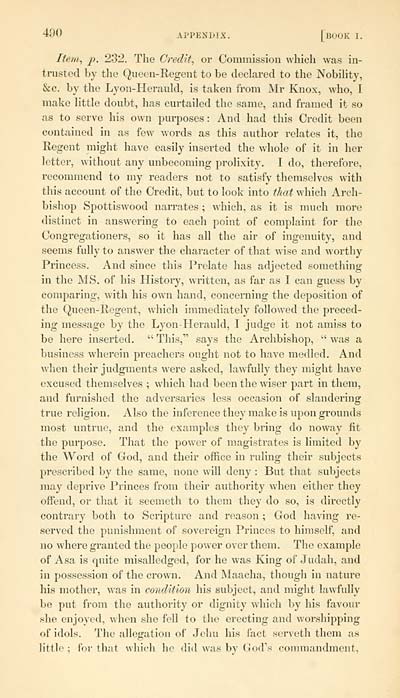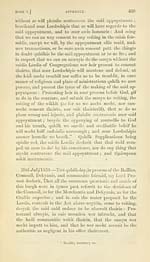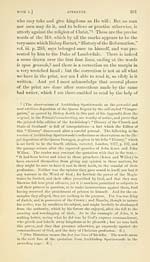Spottiswoode Society > History of the affairs of the Church and State of Scotland from the beginning of the reformation to the year 1568 > Volume 1
(626) Page 490
Download files
Complete book:
Individual page:
Thumbnail gallery: Grid view | List view

490 APPENDIX. [book I.
Item, p. 232. The Credit, or Commission which was in-
trusted by the Queen-Regent to be declared to the Nobility,
&c. by the Lyon-Herauld, is taken from Mr Knox, who, I
make little doubt, has curtailed the same, and framed it so
as to serve his own purposes : And had this Credit been
contained in as few words as this author relates it, the
Regent might have easily inserted the whole of it in her
letter, without any unbecoming prolixity. I do, therefore,
recommend to my readers not to satisfy themselves with
this account of the Credit, but to look into that which Arch-
bishop Spottiswood narrates ; which, as it is much more
distinct in answering to each point of complaint for the
Congregationers, so it has all the air of ingenuity, and
seems fully to answer the character of that wise and worthy
Princess. And since this Prelate has adjected something
in the MS. of his History, written, as far as I can guess by
comparing, with his own hand, concerning the deposition of
the Queen-Regent, which immediately followed the preced-
ing message by the Lyon-Herauld, I judge it not amiss to
be here inserted. " This, 11 says the Archbishop, " was a
business wherein preachers ought not to have medled. And
when their judgments were asked, lawfully they might have
excused themselves ; which had been the wiser part in them,
and furnished the adversaries less occasion of slandering
true religion. Also the inference they make is upon grounds
most untrue, and the examples they bring do noway fit
the purpose. That the power of magistrates is limited by
the Word of God, and their office in ruling their subjects
prescribed by the same, none will deny : But that subjects
may deprive Princes from their authority when either they
offend, or that it seemeth to them they do so, is directly
contrary both to Scripture and reason ; God having re-
served the punishment of sovereign Princes to himself, and
no where granted the people power over them. The example
of Asa is quite misalledged, for he was King of Judah, and
in possession of the crown. And Maacha, though in nature
his mother, was in condition his subject, and might lawfully
be put from the authority or dignity which by his favour
she enjoyed, when she fell to the erecting and worshipping
of idols. The allegation of Jehu his fact serveth them as
little: for that which he did was by God^ commandment,
Item, p. 232. The Credit, or Commission which was in-
trusted by the Queen-Regent to be declared to the Nobility,
&c. by the Lyon-Herauld, is taken from Mr Knox, who, I
make little doubt, has curtailed the same, and framed it so
as to serve his own purposes : And had this Credit been
contained in as few words as this author relates it, the
Regent might have easily inserted the whole of it in her
letter, without any unbecoming prolixity. I do, therefore,
recommend to my readers not to satisfy themselves with
this account of the Credit, but to look into that which Arch-
bishop Spottiswood narrates ; which, as it is much more
distinct in answering to each point of complaint for the
Congregationers, so it has all the air of ingenuity, and
seems fully to answer the character of that wise and worthy
Princess. And since this Prelate has adjected something
in the MS. of his History, written, as far as I can guess by
comparing, with his own hand, concerning the deposition of
the Queen-Regent, which immediately followed the preced-
ing message by the Lyon-Herauld, I judge it not amiss to
be here inserted. " This, 11 says the Archbishop, " was a
business wherein preachers ought not to have medled. And
when their judgments were asked, lawfully they might have
excused themselves ; which had been the wiser part in them,
and furnished the adversaries less occasion of slandering
true religion. Also the inference they make is upon grounds
most untrue, and the examples they bring do noway fit
the purpose. That the power of magistrates is limited by
the Word of God, and their office in ruling their subjects
prescribed by the same, none will deny : But that subjects
may deprive Princes from their authority when either they
offend, or that it seemeth to them they do so, is directly
contrary both to Scripture and reason ; God having re-
served the punishment of sovereign Princes to himself, and
no where granted the people power over them. The example
of Asa is quite misalledged, for he was King of Judah, and
in possession of the crown. And Maacha, though in nature
his mother, was in condition his subject, and might lawfully
be put from the authority or dignity which by his favour
she enjoyed, when she fell to the erecting and worshipping
of idols. The allegation of Jehu his fact serveth them as
little: for that which he did was by God^ commandment,
Set display mode to: Large image | Transcription
Images and transcriptions on this page, including medium image downloads, may be used under the Creative Commons Attribution 4.0 International Licence unless otherwise stated. ![]()
| Permanent URL | https://digital.nls.uk/79604300 |
|---|
| Description | Volume I. |
|---|---|
| Attribution and copyright: |
|

